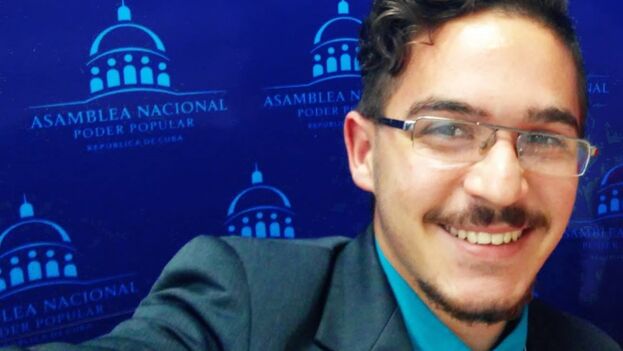
![]() 14ymedio, Havana, 12 October 2022 — The former Cuban deputy to the National Assembly of People’s Power, Luis Ángel Adán Roble, emigrated to the United States, as confirmed by the young man himself on his social networks. “Meta completed in 72 hours,” he wrote on Facebook on Wednesday along with several symbols that suggest he flew from Cuba to Mexico and crossed the US border
14ymedio, Havana, 12 October 2022 — The former Cuban deputy to the National Assembly of People’s Power, Luis Ángel Adán Roble, emigrated to the United States, as confirmed by the young man himself on his social networks. “Meta completed in 72 hours,” he wrote on Facebook on Wednesday along with several symbols that suggest he flew from Cuba to Mexico and crossed the US border
In his message he thanked several people, including his mother, his boyfriend “and everyone who somehow helped me, encouraged me and gave me their blessing in such an important decision.” He also said he was “happy not only to have arrived, but to so many displays of affection. Now, let’s go forward.”
Roble, who was the first openly gay Cuban deputy and LGBTI+ rights activist, left his profession as a doctor at the beginning of 2022, after claiming that his job didn’t provide him with “a decent salary.”
A year earlier he revealed that State Security tried to recruit him and that he had also “been regulated*” by the Ministry of the Interior because they considered him a “person of public interest,” which is why he couldn’t travel outside the country.
In November 2019, Roble posted on his Facebook profile: “At the Extraordinary Meeting of the Municipal Assembly of Centro Habana, Havana, I was granted the release from the position of Municipal Delegate and in turn of Deputy of the National Assembly.”
The text was published a few weeks after the deputy denounced that he couldn’t travel to an international conference in Colombia because the National Centre for Sex Education (CENESEX), led by Raul Castro’s daughter Mariela Castro Espín, denied him its support.
“It’s a little more of the same thing, delayed procedures, playing around or ’I just don’t have the go-ahead’,” he wrote then in a post in which he included several photos with Mariela.
The International Association of Lesbians, Gays, Bisexuals, Trans and Intersex for Latin America and the Caribbean (ILGALAC) was then holding its eighth conference in Colombia, and Roble waited for the authorization of the dean of his faculty but also needed a letter issued by CENESEX, a member of ILGALAC.
“When talking to the Deputy Director of this Institution [CENESEX] I received the answer that they cannot accredit me as an activist to any community social network (although on my previous trip to Colombia in May, they did issue a letter),” Roble said.
The friction with CENESEX began when Roble said that the LGBTI march of May 2019 had not been organized from outside the Island, as Mariela Castro claimed. “It’s a mistake to politicize it and say that it was orchestrated from abroad, nothing farther from the truth, because they are young workers, students, revolutionaries, many of them acquaintances and friends, who made the call,” he stressed.
Shortly after, he amended his statement and ventured that some activists participating in the march received “payments to hold this type of event.”
*Translator’s note: ’Regulated’ is the term applied to individuals by the Cuban government meaning that they are not allowed to leave the country.
Translated by Regina Anavy
____________
COLLABORATE WITH OUR WORK: The 14ymedio team is committed to practicing serious journalism that reflects Cuba’s reality in all its depth. Thank you for joining us on this long journey. We invite you to continue supporting us by becoming a member of 14ymedio now. Together we can continue transforming journalism in Cuba.
